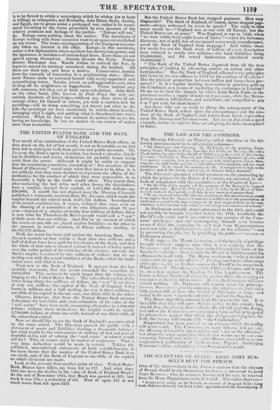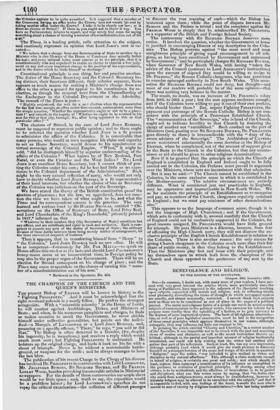THE SECRETARY OF STATE : LORD JOHN RUS- SELL'S SEAT
FOR STROUD.
ONN of the letter-writers in the Times is anxious that the eketors of Stroud should bestir themselves to choose a successor to Lord .lonx RUSSELL; who, he assumes. has vacated his seat, by removal front the Houle Department to the Colonial. The writer observes- " A canvass is going on for Newark on account of Sergeant Wilde being made Solicitor-General, but Lord John's appointment to the Secretaryship of tire-Colonies apps winotice. Is it supposed thida member of the Common% vgan office ;alder the Crown, does not macato his seat by taking anoth4r office linden the. Crown? I lake it to be clearly not law; or is there no chance at Stroud ? If there is, you ought not to throw it way. You have no Parliamentary debates to report, and may surely find room for saying something about &chance of turning a member of a misadministrution out of his The Times, in a leading article, calls attention to the subject, mid cautiously expresses an opinion that Lord Jonses seat is va- cated— " We believe that a change from one Secretaryship of State to another by a Minister who is also lember of the House of Commons does actually forfeit his seat ; and every rational being must concur as to the principle, that it is constitutionally wise and expedient to enable an elector to exercise a free judg- ment on any and every important change in the position of his representative, and in the duties which he hinds himself to discharge."
Constitutional principle is one thing, law and practice another. The duties of the Home Secretary and the Colonial Secretary be- ing distinct, their functions different, their salaries separate, there appears as much reason for making a Minister's change from one office to the other a ground for appeal to his constituents for re- election, as though the removal were from the Chancellorship of the Exchequer to the Colonial Department or the Admiralty. The remark of the Times is just- :" Rightly understood, the writ for a new election when the representative for the first time accepts an office under Government, contemplates more than the simple question, ' Whether the representative ought or not to be a place- min ?' and extends to the inquiry of 'Whether he ought to be retained in his seat for this or that city, borough, &c., after being appointed to this or that particular office ? ' " The electors of Stroud, in the case of Lord Jousi RUSSELL, ' must be supposed to represent public opinion • and to them ought to be referred the question whether Lord Lux is a fit person to administer the affairs of the Colonies. It is conceivable that many persons, who would at once recognize his claim and capacity to-act as Home Secretary, would demur to his appointment as virtual sovereign of the Colonial Empire. "When," it might be satd, "did he distinguish himself by superior understanding of the affairs of the Colonies ? What knows he of New Zealand, Port Natal, or even. the Canadas and the West Indies ? No; Lord Jews is an excellent Home Secretary, but I cannot think of put- ting the Colonies under his care ; for he has had little or no expe- rience in the Colonial department of the Administration." Such might be the very natural reflection of many, who would not only have to decide whether Lord JOUR RUSSELL IS a fit representative of their local interests, but whether the choice of him as Secretary of the Colonies was judicious on the part of the Sovereign. We have stated the theory of the British constitution pond the election of placemen ; but the law, we apprehend, does not sanc- tion the view -We have taken of what ought to be, and what the Tithes and its correspondent assume is the practice. The very learned and curious tract by Sir RUMS Nicot.As, entitled " Ob- eerVations on the Office of Secretary of State, Lord Privy Seal, and Lord Chamberlain of the King's Household," privately printed in 1837,* informed us, that Whatever be their number, they (the Secretaries of State) constitute but One officer, and are edirdinate and equal in rank and authority. Each is com- petent to execute any part of the duties of Secretary of State; the ordinary division of these duties between them being merely matter of arrangement, for the more convenient deapatch of business."
Then it appears, that in transferring himself from " Ikme " to " the Colonies," Lord JOHN RUSSELL took no new office. He will be as competent—fortunately fo,r Mr. Fox MAULE—to speak on Home affairs this ses.,ion as the last ; and should Lord PALMERSTON'S honey-moon occur at an inconvenient time, mu Foreign policy he may also be the proper organ of the Government. There will be no election for Stroud consequent on his change of place ; and the Times may cease to speculate on the chance of turning this " mem- ber of a misadministration out of his seat."
* Reviewed in the Spectator, No. 466.



























 Previous page
Previous page